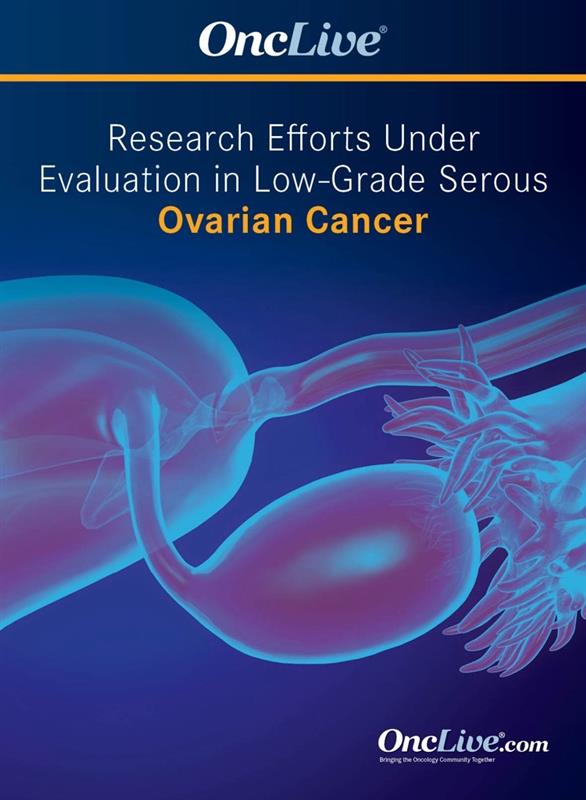Avutometinib Plus Defactinib Signals Changing Tides in Low-Grade Serous Ovarian Cancer
Jubilee Brown, MD, highlights the RAS/MAPK pathway in low-grade serous ovarian cancer and research with avutometinib/defactinib that prompted RAMP 301.
Jubilee Brown, MD

Compounding RAF/MEK inhibition and FAK inhibition through the combination of avutometinib (VS-6766) and defactinib (VS-6063) is opening novel areas of exploration in the treatment of patients with low-grade serous ovarian cancer, according to Jubilee Brown, MD.
In the phase 2 RAMP 201 trial (NCT04625270), treatment with avutometinib monotherapy (n = 31) yielded a confirmed overall response rate (ORR) of 10%, and treatment with the combination (n = 29) led to a confirmed ORR of 45% (95% CI, 26%-64%) in patients with recurrent low-grade serous ovarian cancer.1 The outcomes reported for avutometinib plus defactinib in RAMP 201 prompted the initiation of the ongoing phase 3 RAMP 301 trial (NCT06072781), which is evaluating the combination in this patient population.2 Notably, these trials are enrolling patients with both KRAS-mutant and KRAS wild-type disease.
“RAMP 301 is the perfect example of how we can use personalized medicine in patients with low-grade serous ovarian cancers,” Brown said in an interview with OncLive®.
In the interview, Brown, a professor and director of Gynecologic Oncology at Atrium Health Levine Cancer Institute in Charlotte, North Carolina, highlighted the role of the RAS/MAPK pathway in low-grade serous ovarian cancer, prior research with avutometinib plus defactinib in this population that served as the foundation for RAMP 301, and how this combination may address unmet needs for patients in this relatively rare disease subset.
OncLive: What is the current standard of care (SOC) for patients with low-grade serous ovarian cancer?
Brown: For low-grade serous ovarian cancer, surgery is still the up-front modality we use first. Most patients who present with a low-grade serous carcinoma are going to have surgery first, followed by—in advanced-stage disease—either chemotherapy or hormone blockade [with] an aromatase inhibitor. The SOC is changing as we see it now. Although we still use up-front surgery, the adjuvant therapy [setting] is changing.
For the longest time, we’ve used paclitaxel and carboplatin chemotherapy as SOC for patients with low-grade serous ovarian cancer. However, we know [chemotherapy] doesn’t work as well [in low-grade serous disease] as in other [ovarian cancer] subtypes. [In low-grade serous ovarian cancer], we don’t frequently see the excellent responses [with chemotherapy] that we do in other types of ovarian cancer; therefore, we’ve looked for different [treatment] opportunities. Now, we are investigating the utility of aromatase inhibitors in this disease.
What ovarian cancer pathways might be useful in the development of targeted therapy for patients with low-grade serous disease?
Two pathways are important in low-grade serous carcinomas. The first has to do with hormone receptor–driven tumors. We can use aromatase inhibitors in [ovarian cancer] now because of the abundance of estrogen and progesterone receptors on the tumors, which tend to be responsive to hormone blockade. The second pathway that is novel and targetable is the RAS/MAPK pathway. We can use RAF and MEK clamps now to target that pathway, which appears to be the driver for low-grade serous carcinomas.
What research is evaluating therapies targeting the RAS/MAPK pathway in this disease subtype?
Some exciting research is evaluating the RAS/MAPK pathway and how we can target that pathway. The phase 1 FRAME study [NCT03875820], the first study that investigated this RAF/MAPK pathway [in patients with advanced solid tumors, assessed] a combination of a RAF/MEK inhibitor and a FAK inhibitor. In the FRAME trial, we saw a 46% ORR in the low-grade serous ovarian cancer cohort.
That prompted the RAMP 201 trial, [which was] exciting because [it evaluated [the FAK inhibitor] defactinib in combination with [the RAF/MEK inhibitor] VS-6766, which has now developed a name: avutometinib. [RAMP 201 investigated avutometinib] alone and in combination with defactinib. We saw incredible activity here. In RAMP 201, there was an ORR of 45% in the combination arm, and these appear to be long-lasting responses as well. [The combination is] also tolerable. Interestingly, [this combination] had such a great signal that now we’re opening RAMP 301 to further investigate it.
KRAS is also a driver in these low-grade serous carcinomas. There’s an abundance of KRAS signals in low-grade serous carcinomas. In the RAMP 301 trial, it’s going to be interesting to see how that plays into response. How do patients with KRAS-mutant tumors do with this combination compared [with those with] KRAS wild-type [disease]?
How could this combination fill an unmet need for this patient population?
Patients with low-grade serous ovarian carcinomas represent less than 10% of patients with epithelial ovarian cancers, [and thus] have not had a lot of research directed their way in the past. There’s been a huge unmet need [for these patients], because even though [low-grade serous ovarian] cancers share the title of ovarian cancer, they’re different than the high-grade serous ovarian cancers we’re used to [treating]. The same research does not apply. They’re different cancers, so I’m excited to see interest, funding, and attention paid to these patients who have a rare tumor.
The RAMP 301 trial is exciting because it is a targeted trial. It is absolutely driven to get at the heart of the mechanism of response of what drives these tumors. We’re going to target the pathway that’s overexpressed and target the pathway that’s the driver for the development of these tumors.
References
- Banerjee SN, Ring KL, Van Nieuwenhuysen E, et al. Initial efficacy and safety results from ENGOT-ov60/GOG-3052/RAMP 201: a phase 2 study of avutometinib (VS-6766) ± defactinib in recurrent low-grade serous ovarian cancer (LGSOC). J Clin Oncol. 2023;41(suppl 16). doi:10.1200/JCO.2023.41.16_suppl.5515
- A study of avutometinib (VS-6766) + defactinib (VS-6063) in recurrent low-grade serous ovarian cancer (RAMP 301). ClinicalTrials.gov. Updated May 9, 2024. Accessed May 9, 2024. https://classic.clinicaltrials.gov/ct2/show/NCT06072781




